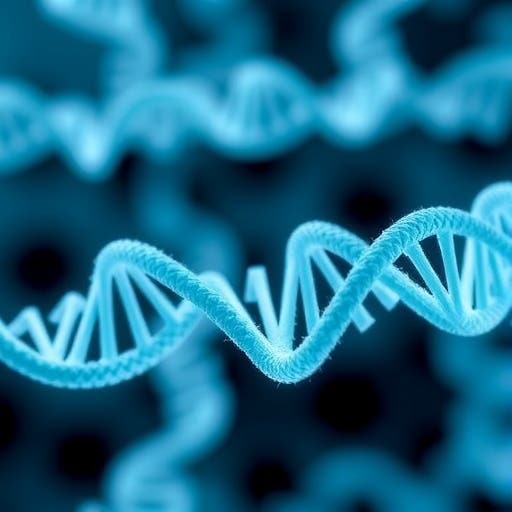Genomics Breakthrough: New Tool Streamlines DNA Research
A new tool standardizes genomic reference sequences, helping scientists speed up research and improve health breakthroughs worldwide.

New tool standardizes genomic data to speed up health research and boost collaboration. (CREDIT: Adobe Stock)
Genomic research holds incredible promise for improving human health, but one major challenge has slowed its progress: confusion over reference sequences. These sequences serve as blueprints for understanding the genetic code. Scientists use them to uncover how diseases form, how cells function, and how genes influence health. But with many researchers creating and naming these sequences differently over the years, comparing data can feel like solving a messy puzzle.
That confusion may soon be a thing of the past, thanks to a new scientific tool developed after four years of dedicated work. Researchers at the University of Virginia have launched a powerful standard that could transform the way scientists work with genetic data. This advance, called refget Sequence Collections, makes it easier to identify and share groups of reference sequences. That means researchers can now save time, reduce errors, and focus on breakthroughs that could change lives.
A New Way to Solve an Old Problem
In the world of genetics, reference sequences act like master copies of DNA sections. They're often built by combining data from many individuals. They help scientists find mutations or variations that could lead to disease. But over time, many groups have created these references using different naming systems. That has made it hard for researchers to compare results from one study to another.
“Imagine a class where each student had a different version of the book,” said Dr. Nathan Sheffield, the lead scientist behind the new tool. “Maybe the words are slightly different, the page numbers don’t match, the chapter titles and numbers aren’t the same and the study questions are in a different order. Those differences in the reference text would make it hard for the students to communicate with each other about what they’re learning, even if the general ideas behind the reference are basically the same.”
This confusion doesn’t just create frustration. It wastes time, introduces errors, and makes it harder to spot patterns in genetic data. Trying to figure out what reference someone used in a past study often involves guesswork and long hours. Even with today’s powerful computers, the process hasn’t been easy to automate—until now.
Making Genomic Work Faster and More Reliable
Dr. Sheffield and his collaborators designed refget Sequence Collections to clean up this process. Their system helps scientists quickly identify and compare entire sets of reference sequences. Instead of tracking each sequence on its own, researchers can now use a single name to refer to a full collection—like an entire genome.
Related Stories
This builds on an earlier system called refget, which gave unique identifiers to individual sequences. That was a big step forward, but it still left scientists struggling to group and match larger sets. The new system goes further by assigning names to these sets, bringing structure and consistency to a field that desperately needed both.
“With a standardized, approved way to refer to references, we can accelerate the understanding we gain from integrating results across many experiments,” said Dr. Sheffield. “I hope this standard helps solve some of the difficulty the scientific community has faced integrating genomic and epigenomic data.”
Genomics depends on sharing information and repeating experiments to confirm results. If different researchers are using slightly different references, their findings may not line up.
With refget Sequence Collections, scientists can be sure they’re using the same source materials. This builds trust in the data and helps teams around the world work together more easily.
A Global Team Tackling a Global Challenge
This tool wasn’t created in a vacuum. Dr. Sheffield worked closely with experts from around the world, including scientists from Norway, the United Kingdom, Canada, and Australia. The work involved leaders from some of the top bioinformatics organizations, such as the European Bioinformatics Institute and the Wellcome Sanger Institute.
These groups came together under the umbrella of the Global Alliance for Genomics and Health (GA4GH), a nonprofit that sets standards for how to use genomic data. GA4GH aims to unlock the full power of genomics while protecting human rights, and it has already developed more than 40 tools to support researchers. The new refget Sequence Collections tool adds another critical piece to that toolbox.
The team focused not only on making research more efficient, but also on increasing collaboration and reducing confusion. As Dr. Sheffield explained, “Refget Sequence Collections can tame the chaos of slightly different references, improving collaboration, sharing and reproducibility of research results based on genomic data.”
This tool marks a major shift in how genomic data gets organized and used. Scientists no longer have to manually trace which version of a reference someone used or guess whether two similar names mean the same thing. They now have a clear, automated way to confirm that they’re on the same page.
The Bigger Picture in Medicine and Health
Though the work may seem technical, its impact could be far-reaching. Understanding the genetic instructions that guide our cells is key to preventing and treating disease. By removing roadblocks in how scientists share and compare data, this new tool could speed up discoveries in cancer, heart disease, rare genetic disorders, and much more.
More accurate comparisons mean researchers can spot tiny changes in DNA that matter in a big way. They can also combine results from many experiments to get stronger, more trustworthy conclusions. Over time, this could lead to new drugs, faster diagnoses, and better tools for personalized medicine.
For example, if researchers in different countries are working on the same genetic disorder, they need to be sure they’re using the same reference sequences. If they’re not, their results could appear to conflict when, in fact, they just used different tools. With refget Sequence Collections, they can avoid that confusion and make progress faster.
The tool also brings more fairness to the process. When everyone has access to the same standards, even smaller labs or those in developing countries can participate fully in global research projects. That helps science become more inclusive and better able to solve health problems that affect people everywhere.
A Future with Fewer Barriers
As genomic science continues to grow, the need for reliable standards only increases. The amount of data being produced is enormous, and scientists need tools that help them make sense of it all. Sheffield’s work offers a way to cut through the noise and focus on what matters: understanding our genes to improve our lives.
The tool he helped create frees scientists from time-consuming tasks and lets them concentrate on breakthroughs. Instead of hunting down obscure references, they can work on solving real problems and discovering how our DNA shapes our health.
Dr. Sheffield’s appointments in genome sciences, molecular genetics, data science, and biomedical engineering reflect the wide impact of his work. His efforts cross many fields, connecting the deep biology of cells with the advanced computing tools that support modern science.
By setting clear, shared standards, Sheffield and his team have opened the door to faster, more accurate, and more inclusive science. The benefits will reach far beyond the lab, helping to bring new treatments and better health to people across the globe.
Research findings are available online in the journal Bioinformatics.
Note: The article above provided above by The Brighter Side of News.
Like these kind of feel good stories? Get The Brighter Side of News' newsletter.



